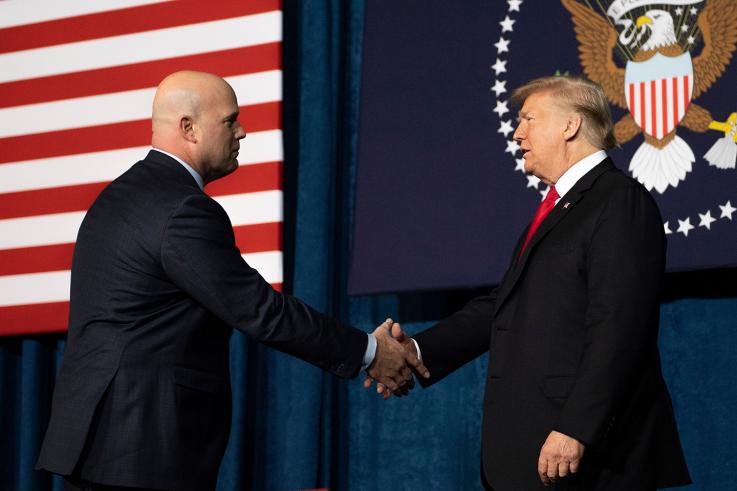Trump could also reach into Nixon’s playbook to incite some sort of military or foreign-policy crisis with Iran, China or North Korea to divert attention and rally public support for him as commander in chief. Two days after firing Cox, Nixon rattled Washington (and the world) when U.S. forces were put on Defcon 3—one step short of war—supposedly to deter a Soviet intervention in the Middle East. But with his presidency teetering the following August, concerns grew that Nixon might even deploy military units to Capitol Hill to evict Congress and forestall impeachment.
特朗普還可以借鑒尼克松的策略,在伊朗、中國或朝鮮問題上挑起某種軍事或外交危機,轉移人們的注意力,并爭取公眾對他擔任總司令的支持。在解雇考克斯的兩天后,尼克松令美國政府(和全世界)感到不安,當時美國軍隊被部署在距離戰爭僅一步之遙的防御工事上,據說是為了阻止蘇聯對中東的干預。但隨著接下來的8月總統任期搖搖欲墜,人們越來越擔心,尼克松甚至可能派遣軍隊到國會山,驅逐國會,阻止彈劾。

Nixon’s defense secretary James Schlesinger and the Joint Chiefs of Staff were keeping “a close watch to make certain that no orders were given to military units outside the normal chain of command,” according to a contemporary account in The Washington Post. “Specifically, there was concern that an order could go to a military unit outside the chain of command for some sort of action against Congress during the time between a House impeachment and a Senate trial.”
《華盛頓郵報》當時的一篇報道稱,尼克松政府的國防部長詹姆斯·施萊辛格和參謀長聯席會議一直在“密切關注,以確保不向正常指揮體系之外的軍事單位下達任何命令”。“具體來說,有人擔心在眾議院彈劾和參議院審判之間的這段時間里,命令可能會落到指揮系統之外的某個軍事單位手中,讓他們對國會采取某種行動。”
In the end, nothing came of it, as Nixon accepted the secret promise of a pardon from Vice President Gerald Ford if he would leave office quickly, according to subsequent accounts through the years. But to others, it was a close call. During a meeting with the Joint Chiefs of Staff in December 1973, 10 months into the televised Senate Watergate committee hearings, Nixon “kept on referring to the fact that he may be the last hope, the eastern elite was out to get him. ‘This is our...last chance to resist the fascists (of the left),’” recalled one of the chiefs in a 1983 Atlantic Monthly piece by journalist Seymour Hersh. “His words brought me straight up out of my chair. I felt the President, without the words having been said, was trying…to find out whether in a crunch there was support to keep him in power.”
最后,尼克松什么也沒得到,因為根據后來多年的報道,尼克松接受了副總統杰拉爾德·福特的秘密承諾,即如果他能迅速離任,將獲赦免。但對其他人來說,這是千鈞一發。1973年12月,在電視直播的參議院水門委員會聽證會進行了10個月后,尼克松與參謀長聯席會議召開會議。‘這是我們……抵抗(左翼)法西斯分子的最后機會,’”《大西洋月刊》記者西摩·赫什在一篇文章中提到的一位領導于1983年回憶道。“他的話讓我從椅子上驚坐起來。他說:“我不知道為什么,我覺得雖然總統沒有說出來,但是在試圖……看看在關鍵時刻是否有人支持他繼續掌權。”
Others thought Schlesinger, in particular, had been overcome by a kind of Seven Days in May paranoia. The defense secretary had come “unglued,” one of the chiefs said.
另一些人則認為,施萊辛格在5月份的偏執被一種7天妄想癥控制了。其中一名官員說,國防部長“脫臼了”。
譯文由可可原創,僅供學習交流使用,未經許可請勿轉載。












